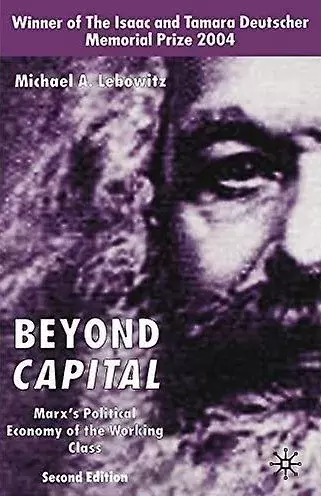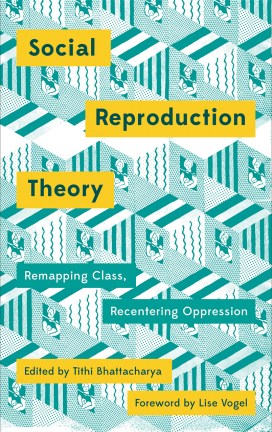|
2/22/2023 Michael Lebowitz, Beyond Capital: Marx’s Political Economy Of The Working Class By: Madelaine MooreRead Now
Returning to the text in 2022, its unique take on some old Marxist questions as well as some weaknesses were more apparent. While some of the arguments working in the background to the book are of their time, in particular, the desire to offer a necessary Marxist antidote to the New Social Movement debates of the 1980s/1990s, many of Lebowitz’s arguments continue to press upon critical points in Marxist theory and have since been taken further by social reproduction theorists and others. Beyond Capital, first published in 1992 and then significantly revised in 2004, still offers a refreshing and critical intervention into why capitalism persists despite ongoing crises, and what is revealed when the working class is approached as subject instead of merely the object of capital reproduction and crisis. Underpinning these arguments is the age-old question of how to reconcile subjectivity and revolutionary consciousness with the abstract forces of capitalist reproduction. Lebowitz bases his argument on the premise that Marx’s Capital was an unfinished project. What is missing, he suggests, is the book on wage labour where Marx would have competed the totality of capitalist reproduction by offering the standpoint of wage labour, through which class subjectivity could be analysed. Yet without this book we are stuck with a one-sided Marxism where only capital is subject. Within this missing book we might find the theoretical foundations to explore how the economic and political are integral to one another, as well as how the intertwined processes of domination, expropriation, and exploitation operate through the living complex human being behind the abstract notion of labour power. Ultimately, Lebowitz is trying to guard against the argument that what drives capital is capital where struggle is an after effect. Although the way he develops his argument, in particular the need to find a perfect mirror or other to existing one-sided categories, can feel forced at times, and certain discussions for example on value and competition remain undeveloped, these are barriers that can (and have) been overcome by others, rather than limitations of the argument itself. Drawing out from the specifics, the overall purpose of Beyond Capital as a treatise against capitalo-centricism, and the steps he takes to get there continue to open up debates in necessary ways. Exploring the missing book on wage labour, Lebowitz begins with the question of needs, and demonstrates that working class needs, or socially necessary labour time, is socially and historically contingent. This flexibility is what distinguishes us from other animals, in that needs shift according to what is available. As a commodity, labour power is unique in that the price of labour power (our wage) can determine our value. Yet, within capitalism, the only way that workers can satisfy their needs is through wage labour and consumption through the market. Although this is a relatively straightforward argument, it is also the foundation for one of the red threads throughout the book: that there is an integral but contradictory relation between these categories within the totality of capitalism. In simple terms, the worker is both labour power and consumer, and although necessary needs are the result of class struggle, ‘each new need becomes a new link in the golden chain that secures workers to capital’, citing Lebowitz. As such, within capitalism, the capacity for workers to realise their needs relies upon capital as mediator, which is where capital’s power comes from. Touching on, without fully entering, labour theory of value debates, what is suggested at here is an argument similar to Harry Cleaver on the value of labour for capital. When Lebowitz asks ‘Why, for example, does capital require a definite quantity of labour if the technical composition of capital is rising?’ his answer can be found in the way that new needs are produced and the reproduction of wage labour. For as long as capital remains mediator, what is reproduced – the value of labour for capital – is a relation of dependence. Rather than labour having a value as a definite input to production, the value of labour for capital is the power relation that is reproduced, and conversely according to Lebowitz: For the worker, the value of labour-power is both the means of satisfying needs normally realised and the barrier to satisfying more – that is, is simultaneously affirmation and denial. Thinking in more concrete terms, when wages decrease the quality of labour power may decrease, or when productivity rises the amount of labour needed to produce each product may decrease, but critically the wage relation is still reproduced. Again, gingerly opening a door to fierce feminist debates on unproductive/productive labour, without delving deep into their claims, Lebowitz concludes that ‘What we are presented with is productive labour for capital, labour which serves the need and goal of capital – valorisation,’ where this is made possible because of the reproduction of this relation of dependence. To re-centre class struggle as a key dynamic rather than after-effect of capitalist reproduction, Lebowitz approaches needs from multiple standpoints, and by doing so demonstrates how needs for labour and needs for capital from these different standpoints are incommensurate. This is reflected in his concept of a political economy of wage labour as the “other” to the political economy of capital. While framed as the counter to capital and reflecting the above tensions, the political economy of wage labour remains within the totality of capitalism. It is not equal in power—even if his graphics seem to suggest some equality – a constant annoyance in the reading group!—and serves a necessary function in the reproduction of the system as whole. What this concept allows us to do is approach the multiple circuits of production and reproduction from different standpoints (here touching on although not referencing feminist standpoint theory as much as Lukács’ approach to proletarian praxis), which centres rather than sidelines working class experience, logics, and needs. As such, unlike some autonomists or feminist interventions, Lebowitz makes a convincing argument that these other circuits are not autonomous from capital but rather operate within the totality and remain mediated by the demands of valorisation. However, this mediation does not mean that the political economy of wage labour is the same as the political economy of capital. The political economy of wage labour although essential to the reproduction of capitalism as a whole also exceeds it. Put differently, human experience is more than that which is visible on the terms of capital: concrete labour is not commensurate with abstract labour and it is this “extra” or messiness that Lebowitz, alongside many social reproduction theorists, are interested in. The worker is both wage labourer and non-wage labourer and this occurs through the same labouring body. There is—to borrow David McNally’s terms—a unity in difference within the totality, a totality understood here as a methodological premise that points to the way that the economic mediates and colours these other integral parts of the totality in complex and contradictory ways.
what are the implications of labour power being produced outside the circuit of commodity production, yet being essential to it? In looking at the complex and dual role that schools, hospitals, or water services play as sites of social reproduction, workplaces, but also necessary conditions for the reproduction of capitalism as a whole, we can begin to untangle the strategic complexities of class struggle and demands, but also return to Lebowitz’s driving questions – why does capitalism persist? And why is the working class not revolting? As such, the crisis theory that is put forward is layered, dynamic, and can only be understood fully by approaching crisis from these different standpoints. Making a distinction between limits and barriers where limits tend to be turned into barriers that can be overcome, it becomes clearer how crises are central to the dynamism of capitalism and are more often crises in, rather than of, the system. Again, re-framing common categories through a new lens, Lebowitz argues that M-C-M’ – understood as the need for continuous growth – could be re-framed as growth – barrier – growth where ‘the story of capital within the sphere of production is that of its tendency to drive beyond all barriers.’ Although more implicit rather than explicit, this dovetails with much current debate on primitive accumulation as a necessarily continuous process, and could offer an interesting take on current discussions on de-growth, although neither are pursued in the book. While capital’s dynamism comes from its capacity to transform limits into barriers—creating new sites for accumulation, new needs, and new dependencies—the one limit for Lebowitz that cannot be overcome is that of the working class. However, like all Lebowitz’s claims and going back to his original question of why the working class—the real limit—is not revolting, the answer is not straightforward. Even if we can analytically approach the working class as a unified subject, this does not mean it sees itself that way. As Lebowitz argues, ‘Once we consider the worker as subject, then the conditions within which workers themselves are produced (and produce themselves) emerge as an obvious part of the explanation for the continued existence of capitalism.’ If we are to take seriously the conditions within which the working class are (re)-produced, it is a subject mediated by structures of exploitation, oppression and domination. Offering a critical counter to more orthodox Marxist analysis of his time and another link to social reproduction theory, Lebowitz demonstrates how race and in particular gender divisions are not secondary struggles, because ‘as long as our subject is capital, it may be appropriate to consider these human beings only in their characteristic as wage-labourer. Yet, as soon as the subject becomes wage labour, it is necessary to consider the other relations in which people exist.’ There are multiple standpoints and strategic barriers within the working class. For example, wage labour for women may weaken patriarchal power relations within the household and could represent a way out of domestic slavery, while the family wage—a core tenet of welfare state policy—might strengthen the power of the male breadwinner model. While such binary terminology is of its time, the implication of this argument is that there is no singular experience of exploitation and that the male blue collar worker and his trade union is not necessarily the singular agent of change. As counter, Lebowitz calls on us to recognise all struggles against capital as the mediator of needs and tackle the separation of workers, or as Bhattacharya suggests against capital in general, as potential class struggles. It is the underlying power of capital as a whole that must be confronted, not only the power of individual bosses or capitalists. Ultimately, we need to go beyond merely economic struggles, and recognise the integral relation between the economic and political. However, how we do this, beyond developing a broad and inclusive understanding of the working class and class struggle that can include the home and neighbourhood, remains largely undefined. To conclude, Beyond Capital remains an important intervention into Marxist theory and methodology. Lebowitz offers a refreshing take on longstanding questions around capitalism’s durability and the subjectivity of the working class. He opens analytical problems that others, especially social reproduction theorists, have taken further in fruitful ways. While we are left without a clear political strategy, we are given analytical tools to understand the working class as a diverse actor who equally struggles in their workplace, in their home, and in their neighbourhood. Moreover, the process of struggle, although not simple is productive, as through struggle the separation of the working class (the power of capital for Lebowitz) may be overcome and new subjects produced. As he suggests, the process of struggle itself is useful: It is not that the end to patriarchy or racism as such is incompatible with the continuation of capitalism but, rather, that the people who have struggled to end patriarchy and racism may be. Beyond Capital helps us to understand why capitalism continues to persist despite endless crises, by drawing our attention to the messiness of human beings and the multiple circuits that reproduce capitalism as a complex and contradictory totality. AuthorMadelaine Moore Dr. Madelaine Moore is a post-doctoral researcher at Bielefeld University, Germany. Her research develops a political economy from below by exploring water governance and the emergence of eco-social policies through Marxist and Feminist theory. Her PhD, which explored struggles over the expropriation of water in Australia and Ireland, won the Jörg Huffschmid Award and she was a Rosa Luxemburg Foundation scholar. Her monograph A Time of Reproductive Unrest will be coming out in early 2023 with Manchester University Press in the Progress in Political Economy book series. This article was republished from Progress in Political Economy. Archives February 2023
0 Comments
Leave a Reply. |
Details
Archives
July 2024
Categories
All
|



 RSS Feed
RSS Feed